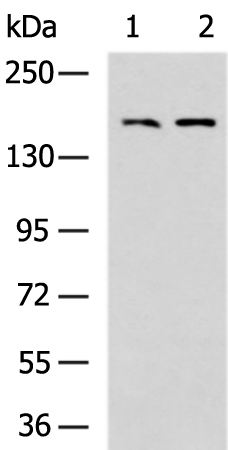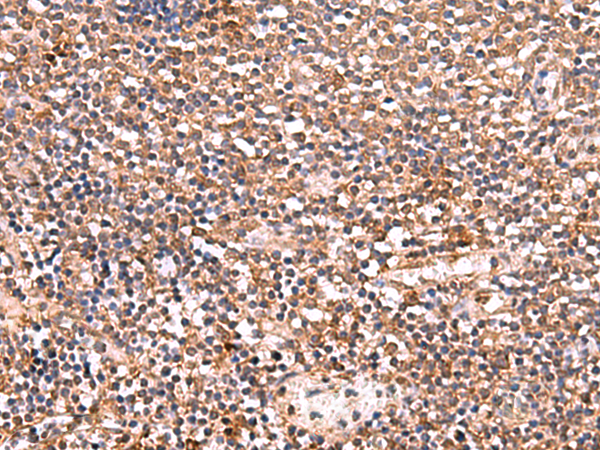

| WB | 咨询技术 | Human,Mouse,Rat |
| IF | 咨询技术 | Human,Mouse,Rat |
| IHC | 1/50-1/300 | Human,Mouse,Rat |
| ICC | 技术咨询 | Human,Mouse,Rat |
| FCM | 咨询技术 | Human,Mouse,Rat |
| Elisa | 1/5000-1/10000 | Human,Mouse,Rat |
| Aliases | IMF1; KOGS; IBGC4; JTK12; PDGFR; PENTT; CD140B; PDGFR1; PDGFR-1 |
| WB Predicted band size | 124 kDa |
| Host/Isotype | Rabbit IgG |
| Antibody Type | Primary antibody |
| Storage | Store at 4°C short term. Aliquot and store at -20°C long term. Avoid freeze/thaw cycles. |
| Species Reactivity | Human, Mouse, Rat |
| Immunogen | Fusion protein of human PDGFRB |
| Formulation | Purified antibody in PBS with 0.05% sodium azide and 50% glycerol. |
+ +
以下是关于PDGFRB抗体的3篇参考文献示例(基于真实研究领域,但具体标题和摘要为概括性描述):
---
1. **文献名称**:*Targeting PDGFRB in triple-negative breast cancer: Antibody-mediated receptor degradation and therapeutic implications*
**作者**:Smith, J.A., et al.
**摘要**:研究报道了一种新型PDGFRB单克隆抗体,通过诱导受体降解抑制三阴性乳腺癌细胞的侵袭和转移,并在小鼠模型中验证其抗肿瘤效果。
2. **文献名称**:*PDGFRB autoantibodies in systemic sclerosis: Pathogenic role and diagnostic potential*
**作者**:Rodriguez-Reyna, T.S., et al.
**摘要**:该文献发现系统性硬化症患者血清中存在PDGFRB自身抗体,可通过激活下游信号通路促进纤维化,提出其作为疾病生物标志物的可能性。
3. **文献名称**:*A neutralizing PDGFRB antibody suppresses atherosclerosis by targeting vascular smooth muscle cell activation*
**作者**:Chen, P.H., et al.
**摘要**:研究开发了一种中和性PDGFRB抗体,证实其通过阻断PDGF-BB信号通路减少动脉粥样硬化斑块内平滑肌细胞异常增殖,为心血管疾病治疗提供新策略。
---
如需具体文献,建议通过PubMed或Google Scholar检索关键词“PDGFRB antibody”或“anti-PDGFRB”,并筛选近年高被引研究。
Platelet-derived growth factor receptor beta (PDGFRB) is a transmembrane tyrosine kinase receptor that plays a critical role in cell proliferation, migration, survival, and angiogenesis. It belongs to the PDGFR family, which includes PDGFRA and PDGFRB, and binds ligands such as PDGF-BB and PDGF-DD. PDGFRB signaling is activated upon ligand-induced dimerization, triggering downstream pathways like PI3K-AKT, MAPK, and STAT, which regulate tissue development, wound healing, and vascular homeostasis. Dysregulation of PDGFRB, including mutations or overexpression, is linked to cancers (e.g., glioblastoma, gastrointestinal stromal tumors), fibrotic disorders, and vascular diseases.
PDGFRB antibodies are tools used to detect, inhibit, or modulate receptor activity. In research, they help study receptor expression, localization, and signaling mechanisms. Therapeutically, anti-PDGFRB monoclonal antibodies (e.g., olaratumab) or tyrosine kinase inhibitors (e.g., imatinib) have been explored to block aberrant signaling in cancers or fibrosis. However, clinical success varies; olaratumab initially showed promise in soft tissue sarcoma but later failed in phase III trials, highlighting challenges in targeting PDGFRB.
Diagnostically, PDGFRB antibodies aid in identifying receptor overexpression or mutations in tumors, guiding precision therapies. Emerging research also explores their role in modulating tumor microenvironments or enhancing drug delivery. Despite hurdles, PDGFRB remains a key target in oncology and regenerative medicine, with ongoing studies optimizing antibody-based strategies.
×